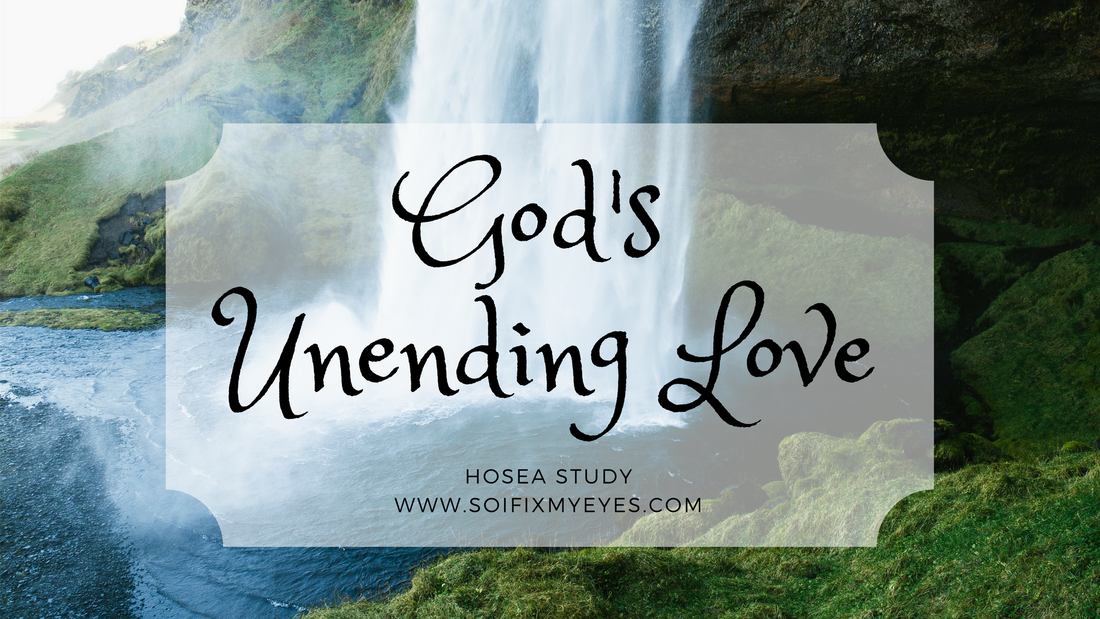God's Unending Love8/12/2017 Doom and gloom. Impending judgment, prophesies of captivity, and verdicts of rejection. It’s all kind of starting to sound depressing, isn’t it?! As you read these posts and parts of Hosea, you may be wondering, “Where’s the God of mercy and love found in the New Testament? Or what happened to grace?” Don’t worry! The God of the New Testament is the same God of the Old. His love has not changed; His mercy and grace are still abundant and evident during this dark period of Israel’s history. For, mixed in with God’s messages of rejection, contention, and holy anger are these seemingly conflicting word of tenderness, compassion, and unending love. “How can I give you up, O Ephraim? How can I hand you over, O Israel? How can I make you like Admah? How can I treat you like Zeboiim? My heart recoils within me; my compassion grows warm and tender. I will not execute my burning anger; I will not again destroy Ephraim; for I am God and not a man, the Holy One in your midst, and I will not come in wrath.” ~Hosea 11:8-9 It is almost as if remembering the old days reawakened God’s love for Israel. But God’s love was never far off. Even in the midst of His wrath, God still deeply cared for this wayward people and was why He spent so much time sending prophets and messengers to warn the people of His displeasure. Though we don’t often equate the messages of the prophets as love letters, they truly are letters revealing God’s unending love for a stubborn and obstinate people. It was a love that was unconditional and saw beyond repeated failures. It was a love that was not earned or merited but simply given and freely bestowed upon an unworthy people. And it was a love that sometimes seemed to collide with the holy wrath ignited by sin. Nevertheless, God’s relentless divine love is just as intrinsically part of His character and nature as uncompromising holiness. The former attribute can look beyond the faults and failures to the potential and unrefined treasure, while the latter casts a strict black-and-white perspective—sin is bad and must be punished. So how do we reconcile the two? How can we attempt to understand unending, endless love while at the same time not lose the gravity of God’s holiness? Both attributes seem to be at opposite ends of the spectrum! We don’t have to reconcile the two. God did that work on the cross. Those two beams hastily put together represent the moment when God’s holiness and God’s love made a way for sinful man to become righteousness and able to stand, unashamedly in the presence of His Maker. Upon that outstretched board God reigned holy judgment for all the sins of the world and His unending, relentless love for us was revealed in the fact that it was not one of us—you or me—bearing that ultimate judgment but Christ. Jesus Christ is how holiness and divine love made a way, and it was on the cross that both were satisfied. It was an amazing feat, a huge sacrifice, and a God-sized solution to man’s inherent problem. May we never again take the work of the cross for granted! But what about Old Testament Israel? The birth of Jesus Christ was still over 700 years away! Did God still love them even though the work of the cross was yet to come? Of course! And we see manifestations of God’s love in the fact that He repeatedly warned Israel of His impending judgment and gave them a way out. He stayed His hand and did not completely wipe them out as He did other godless nations, but merely allowed them to return to captivity. Yet even in that, Hosea records God’s turmoil of heart and pain at the need to bring harsh discipline upon His beloved people. So even though Hosea and the other books of prophesy may seem severe and void of compassion and mercy, God’s unending love is evident throughout and is there—a constant in the midst of Israel’s waywardness and blatant sin. And the God who never gave up on His special people but relentlessly loved them is the same today. He’s a God who is actively inviting us into intimate relationship and fellowship with Him. No matter what we’ve done or how far we’ve wandered, He’s waiting and wanting to bring us back and lavish His eternal love upon us. As the LORD said through the prophet Jeremiah: “I have loved you with an everlasting love; therefore I have continued my faithfulness to you.”
~Jeremiah 31:3b
Comments
|

 RSS Feed
RSS Feed